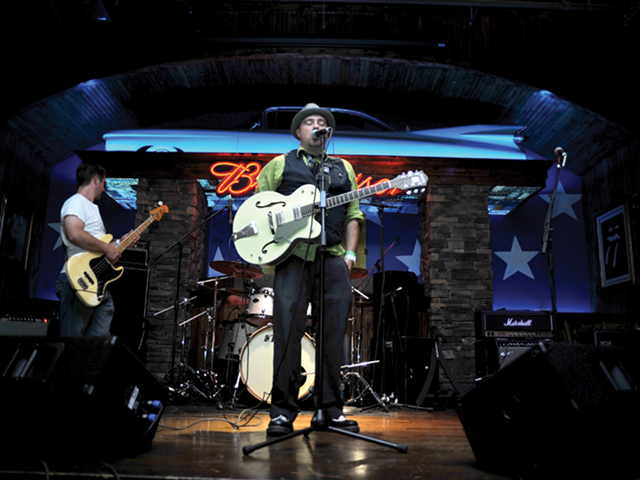It’s hard to imagine a more fantastical introduction to the world of music than Memphis teenager Booker T. Jones experienced in the early 1960s. Jones — a Rock and Roll Hall of Fame member as well as recipient of a Lifetime Achievement Grammy — is one of the headliners for this year’s MidPoint Music Festival. He and his touring band will be doing swingin’ ’60s Booker T. & the MG’s classics as well as selections from Jones’ new album, The Road From Memphis.
By weekday, while still a teen, Jones was at Indiana University studying Classical music composition and theory. On weekends, he’d go back to Memphis to play Hammond B-3 organ and lead his quartet, the MG’s, as the funky, soulful house band for the then-new Stax Records label. Besides supporting the likes of Otis Redding, Carla Thomas, Sam & Dave, Albert King and William Bell, the MG’s turned out their own tightly irresistible instrumental singles in the 1960s, including the classic “Green Onions” (their first release), “Hang ‘Em High,” “Hip Hug-Her” and “Time Is Tight.”
As if that wasn’t enough, the teenager also found himself invited to New York by the older Quincy Jones (no relation), already a well-respected, important music-industry figure after serving as trumpeter and arranger for such Jazz leaders as Dizzy Gillespie, Lionel Hampton and Cannonball Adderly. Quincy Jones had arranged an organ-based song by Ray Charles, “One Mint Julep,” that was an early inspiration on Booker.
Quincy took Booker T. to clubs to hear Jazz groups like the Thad Jones-Mel Lewis Big Band. And while showing the teenager the world of Jazz, he asked him about the comparatively simple, riff-driven “Green Onions.”
“He thought ‘Green Onions’ was the funkiest thing he’d ever heard,” Jones, now 66, recalls during a phone conversation from his California home. “I think the thing that fascinated Quincy was he had trained himself to become so sophisticated musically, and that we were so raw and unsophisticated. That’s what he liked about it. He would say, ‘How do you get that funk, man?’ For Quincy Jones to ask me a question about anything was amazing.”
Booker T. was a child prodigy — he began studying keyboards early and also learned several other instruments. His first performance on a Stax recording, when the infant label was still called Satellite Records, involved playing baritone sax on a track by Rufus and Carla Thomas. And an even earlier turn on sax, sitting in with Willie Mitchell’s popular Memphis band, led to him meeting two older band members — drummer Al Jackson Jr. and bassist Lewie Steinberg — who would become MG’s. Later, while hanging around a record store next to the Stax studio, he met two clerks — Steve Cropper and “Duck” Dunn — who would also join the MG’s. (Cropper played guitar; Dunn replaced Steinberg on bass.)
Because Cropper and Dunn were white, the integrated MG’s were a rarity in early Rock and Soul, especially in a Southern city like Memphis.
“I think it was crucial we formed and be something like a beacon for people, saying ‘It’s OK to be interracial and do whatever you want to do musically,’ ” Jones says. “For Memphis, it was. At the time, it didn’t seem that important. It seemed we were thrown together as a coincidence.”
Even as Jones tackled some very complex music theory at I.U., he was providing the underpinning for countless hits for teens.
“We had a spoken and unspoken mantra to keep it simple and keep it funky (at Stax),” he says. “That meant keep it accessible and close to the people, funky and blues-based. I was aware it was different from what I was studying, but I felt I needed to study, still. I wanted to study because I couldn’t execute what I was hearing in my head and a lot of music was inside me that I couldn’t write down. And I head heard people like Hoagy Carmichael and Duke Ellington and knew what they had done, and that I was nowhere close to that. So I needed some training.”
Jones moved to L.A. in the early 1970s, just ahead of Stax’s decline and collapse. Although his career has been lower profile, he’s had a long and steady career as a player, arranger and producer, and has toured off and on with a reunited MG’s (without Jackson, who was murdered in 1975). He released a couple Folk-Rock/Soul albums in the early 1970s with then-wife Priscilla Coolidge (Rita’s sister), as well as a couple of solo ones, but then stopped to concentrate on other endeavors.
Lately, though, he’s gotten busy recording albums under his own name. An all-instrumental solo release, Potato Hole, came last year and won a Grammy. And this year’s New York-recorded The Road From Memphis branches out to include vocals. He sings on one song, “Down in Memphis.” And Sharon Jones (again, no relation) and Matt Berninger (Cincinnatian and singer for Indie Rock stars The National) share vocal duties on another, the standout mid-tempo Soul serenade “Representing Memphis.” Jones promises he and his touring band will do some singing at the MidPoint gig, and he might even pick up a guitar in addition to playing organ.
“I take freedom now on stage I didn’t have with MG’s,” he explains. “But I do a lot of MG’s songs because I love them. And I do favorites of mine, things that touched me years ago like ‘Knockin’ on Heaven’s Door.’ I do whatever happens on stage that I feel is appropriate at the moment. I’m taking the liberty to do that now.”
BOOKER T. JONES
performs at the MidPoint Music Festival
Friday at 11:30 p.m.
at the
Cincinnati Club. Go here for all the MPMF details (performers, venues, new features, ticket options and latest news).






